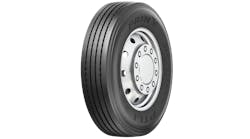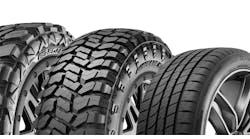Retread industry leaders and professionals from around the world gathered at the 2015 Global Tire Expo’s first Global Retread Symposium to discuss retread issues that cross international boundaries and impact the industry as a whole.
A central issue for retreaders in the U.S., Europe and some Latin American countries is the import of Tier 4 Asian-made truck tires.
The symposium was put on by the Tire Industry Association (TIA) and the Tire Retread & Repair Information Bureau (TRIB) on Nov. 4 in Las Vegas during Automotive Aftermarket Industry Week. The symposium opened with overviews of the North American, European and Latin American markets, respectively, presented by:
* David Stevens, managing director, TRIB;
* Ruud Spuijbroek, secretary, Bipaver, the European retread industry's trade association representing national retreading associations and leading suppliers to the retreading industry from 10 member states; and
* Aldo Bastos, director of international business for Borrachas Vipal S/A of Brazil, which manufactures tire retread and tire inner tube repair materials.
Each discussed a variety of conditions and concerns specific to their markets. Spuijbroek covered several issues faced by European retreaders, including the requirement for tire labels that convey safety and environmental information about the tire.
Bipaver was able to obtain a short-term exemption from labeling requirement for retread tires. The association is developing a Web-based tool that predicts the rolling resistance, wet grip, and rolling noise emission values, enabling retreaders to comply with the labeling regulations.
Bastos discussed the efforts of Alarneu, a trade association established two years ago, to boost the retread business in Latin America. For example, Chile is planning to regulate the final disposal of a tire casing. The extended producer responsibility program aims to reduce waste disposal, conserve resources, increase recycling and encourage more environmentally friendly product design. Producers and importers will have to show a system for managing the disposal of tires. “Once you have imported tires, you justify that you have one, two retread processes for the case,” he said.
Bastos discussed programs in other Latin American countries to increase retreading. He also covered Alarneu's efforts to develop measures to certify the quality of the tires produced by retread shops and to promote the environmental benefits of retreading.
Stevens, Spuijbroek, and Bastos devoted a portion of their presentations to Tier 4 imports from China. Spuijbroek told attendees the impact of Tier 4 imports became significant after the Russian-led Eurasion Economic Union imposed antidumping measures for its member countries.The result was a“tsunami of containers” flowing into European markets.
“Having these anti-dumping measures all over the world creates a change of flow into Europe. It's a very serious one," he said.
"The second thing about anti-dumping is that when you have a look at the legal aspects of anti-dumping, it means that you are comparing new tires to new tires. Legislators are not used to creating legislation for anti-dumping in comparing new Chinese tires to retreaded tires. And today the price of a Chinese tire equals a retail tire. And if you had as an operator the choice between a new tire of 140 dollars or a retreaded at 140 dollars, the operator makes his choice and chooses non-European brands, cheap brands.”
The Tier 4 import situation varies among Latin American countries. Duties protect local retread producers in countries such as Argentina and Brazil. With the anti-dumping tax, the price of low-quality tires is about the same as premium quality tires produced in Brazil, according to Bastos. But in Chile, which is a partner in the Transpacific Partnership Agreement and does not tax imports, more and more Tier 4 Chinese truck tires are “taking the place of the local producers.”
Three retreaders fielded questions from the audience as part of a discussion moderated by Bob Hendry, vice president of 31 Inc. and TIA board member. The panelists representing the North American., European and Latin American markets respectively were: Brian Hayes, division vice president at Purcell Tire & Rubber Co., Salvadore Perez Lucena, international commercial director for Grupo Soledad/Insa Turbo, and Dario Andreani, president and chief executive officer, Insamar.
The panelists were asked what retreaders and the retreading industry can do to remain competitive and viable in the face of considerable market price pressure from low-cost Asian-made truck tires. Excerpts from their responses follow.
Hayes: I tend to be an optimist because I'm in the business and there have been great strides in technology with retreading. Fleets have demanded it. And as a result, the manufacturers of the premium products have produced high-quality casings that outlast the original lifetime of the tire. Within our company and I think domestically the message is about buying a premium versus a Tier-3 or Tier-4 product. There's always going to be competition and a low-cost tire, but I think the message needs to be the upfront cost versus the total cost of ownership. I think as long as we're on the right page talking about the value of the premium casing that will go a long way in shoring up retreading.
Perez Lucena: We know the Chinese tires are going to remain in the market and maintain this price. We work to be in another segment, in the ecological segment and put in our brands the ecological effect of the retread. We think it's the only way to work.
Andreani: Low-quality tires are not that cheap. You can pay a small price for your new tire, but in long- or mid-term, that tire will be the most expensive because it's disposable. You can't do a good retread process on them, and that costs more for the environment because we fill lands of waste with that tire. From my point of view the only way to go out of this low-quality pressures are going deeply in quality, retreading quality and go deeper into the environmental issues of retreading tires.



